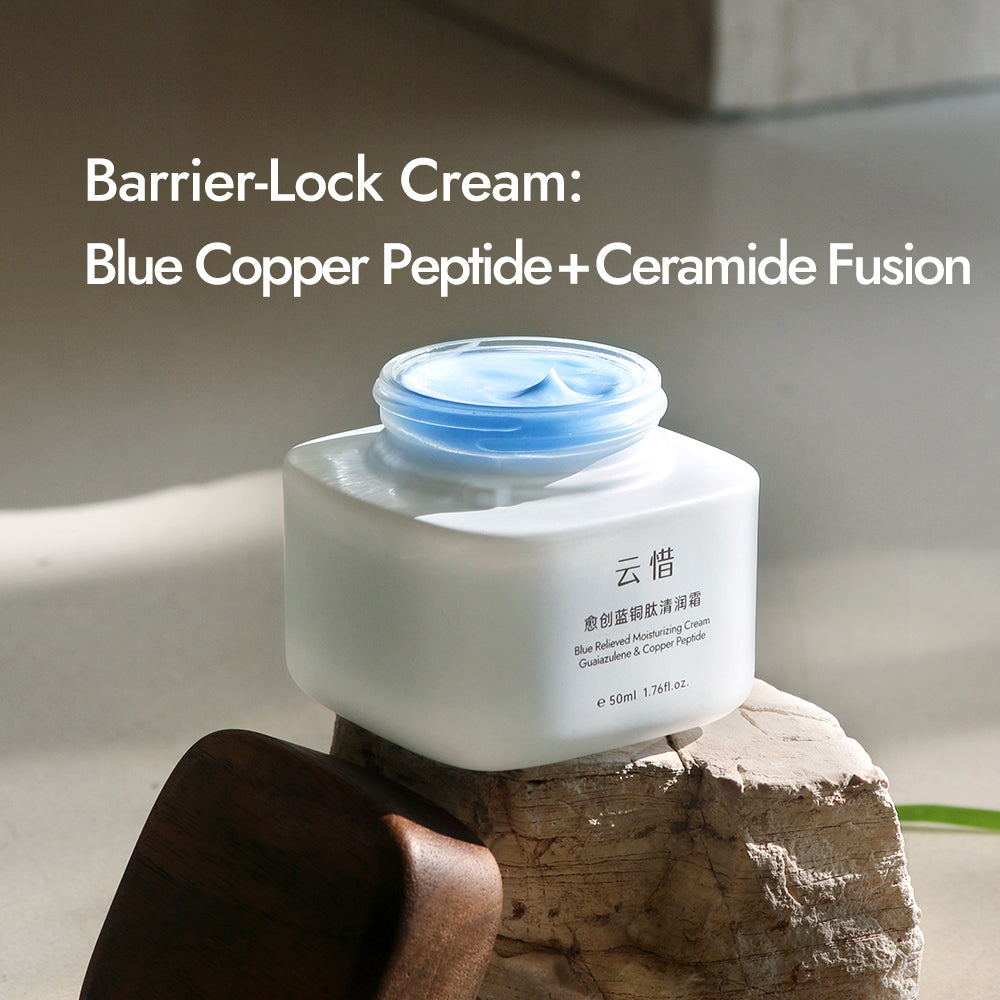
Oily or CC-Prone Skin? How Our Copper Peptide Skincare Line Restores Balance
Share
Oily or CC-Prone Skin? How Our Copper Peptide Skincare Line Restores Balance
Imagine your bathroom counter: a scrub cleanser, a volcanic clay mask, or a strong foaming gel. If these are your go-to products, chances are your skin is oily—or at least thinks it is.
Ironically, many people with oily or closed comedone-prone skin aren’t overproducing oil naturally. Dehydration and a compromised skin barrier can trigger your sebaceous glands to overcompensate, producing more oil to lock in water. This phenomenon is called compensatory sebum production and is well-supported by scientific research:
-
Denda et al., J Invest Dermatol, 1998: Human skin studies show transepidermal water loss (TEWL) ↑ → sebum secretion ↑
-
Rawlings et al., Int J Cosmet Sci, 1994: Over-cleansing or exfoliation increases TEWL and triggers excess sebum
-
Lodén, Dermatologic Therapy, 2003: Restoring barrier function reduces oil production in previously dehydrated, oily skin
When your skin lacks water, it cannot generate hydration on its own. The only protective mechanism it has is increasing oil secretion, which often worsens clogged pores, dullness, and texture irregularities.
Why Over-Cleansing and Exfoliating Can Backfire
-
Harsh cleansers (foaming gels, scrubs) strip both oil and water from the skin.
-
Over-exfoliation—scrubs, brushes, or strong acids—damages the barrier and leaves skin raw and dehydrated.
-
Result: The skin reacts by producing more oil, creating the “oily but dehydrated” paradox.
How to Correctly Hydrate and Protect Oily Skin
-
Gentle Cleansing
-
Use creamy, lotion, or light oil-based cleansers that remove impurities without stripping water.
-
-
Hydration First
-
Apply a hyaluronic acid serum or toner to restore water content.
-
Hydrated skin produces less compensatory oil, improving texture and comfort.
-
-
Barrier Repair & Soothing
-
Avoid strong actives or scrubs until your barrier is restored.
-
Use products that strengthen the skin barrier and calm irritation, which helps reduce closed comedones over time.
-
How Our Copper Peptide Series Helps
Our Blue Copper Peptide Line is formulated to address oily, dehydrated, and CC-prone skin, combining hydration, barrier repair, and gentle oil balance:
-
Hydration & Barrier Support
-
Glycerin, sodium hyaluronate, hydrogenated lecithin, ceramides (NP, NS, NG, AP) restore water content and strengthen the skin barrier.
-
-
Non-Comedogenic Moisturization
-
Squalane, jojoba oil, and light esters (coconut alcohol esters, lauryl esters) hydrate without clogging pores, ideal for oily/CC-prone skin.
-
-
Anti-Inflammatory & Soothing
-
Aloe, neem leaf/flower extract, turmeric root, basil and holy basil extract, myrrh oil, rose and lavender oils calm irritation and reduce redness, lowering the risk of new closed comedones.
-
-
Repair & Anti-Aging
-
Copper peptides (Tripeptide-1 Copper), inositol, and plant sterols support collagen synthesis, skin repair, and texture improvement.
-
By combining hydration, barrier repair, and gentle oil balance, this line addresses the root cause of oily, dehydrated skin, instead of simply stripping oil away.
Tips for Best Results
-
Use gentle cleansing first
-
Apply hyaluronic acid or hydrating serum
-
Follow with the Copper Peptide moisturizer
-
Avoid over-exfoliation until your barrier is restored
-
Consistency matters—hydration and barrier repair normalize oil production over time
✅ Key Takeaway
Oily skin doesn’t always mean you need to eliminate all oils. Proper hydration, barrier repair, and non-comedogenic moisturizing can actually reduce excess oil, improve texture, and restore skin balance—backed by clinical studies and real-world observation.
